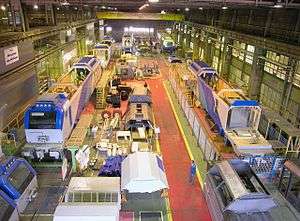Iranian Railways AD43C
The AD43C is a type of mainline 6 axle Co'Co' diesel locomotive designed by Alstom and used by the Islamic Republic of Iran Railways (RAI). It was in production from 2000. Delivery started in 2002.
| AD43C | |||||||||||||||||||||||||||||||||||||
|---|---|---|---|---|---|---|---|---|---|---|---|---|---|---|---|---|---|---|---|---|---|---|---|---|---|---|---|---|---|---|---|---|---|---|---|---|---|
 AD43Cs under construction at Wagon Pars (2009) | |||||||||||||||||||||||||||||||||||||
| |||||||||||||||||||||||||||||||||||||
| |||||||||||||||||||||||||||||||||||||
| |||||||||||||||||||||||||||||||||||||
| |||||||||||||||||||||||||||||||||||||
| |||||||||||||||||||||||||||||||||||||
Alstom designated the vehicle with product code Prima DE 43 C AC.
Background
In 1998 GEC Alstom won an order valued at $125 million (later valued at €192 million[3]) for the supply of 100 mixed use locomotives for Islamic Republic of Iran Railways.[4] The first 20 units were to be manufactured at Alstom's factory in Belfort, France, the remainder at Wagon Pars in Iran.[3][note 1] After production of an initial batch by Ruston the remaining engines were to be built by DESA in Iran under a technology transfer agreement.[5]
Design
The locomotives are a 6-axle Co'Co' twin cab design, incorporating a RK 215 engine with a power at rail of 2,880 kW (3,860 hp).[6] After premature failures both in engine and turbocharger RAI has de-rated the engine power gradually up to 2400 Kw.
Three variants were produced, a passenger version with a 150 km/h (93 mph) top speed and a 20.5-tonne (20.2-long-ton; 22.6-short-ton) axle load, and two freight versions with a 110 km/h (68 mph) top speed and either a 20.5-or-23-tonne (20.2-or-22.6-long-ton; 22.6-or-25.4-short-ton) axle load.,[2] Only two prototypes of ballasted locomotives had been introduced;as, the ballasts limited the engine room space and higher center of gravity raised concerns, the ballasts were later removed completely. The passenger locomotives were later assigned for freight service because of low reliability and introduction of more reliable ER24PC locomotives.
Current conditions
As of the early of 2016 only a third of AD43C locomotives are in revenue service. These locomotives have undergone substantial modifications since RAI put them into service. Most of the out of service locomotives have been cannibalized for salvaging components to make operation of the in-service locomotives possible. As maintaining of the locomotives in service out-costs their revenue, Iranian railways has decided to retrofit these locomotives with other engines.
See also
- Iranian locomotives
- IranRunner
References and notes
Notes
- Wagon Pars undertook superstructure and bogie manufacturing, as well as assembly and commissioning[2]
References
- "Diesel electric locomotives AD43C". www.wagonpars.com. Archived from the original on 6 October 2011. Retrieved 25 June 2011.
- "Main line Locomotive AD43C (Under License of Alstom)" (PDF). www.wagonpars.com. Wagon Pars Co. Archived from the original (PDF) on 6 October 2011. Retrieved 25 June 2011.
- "ALSTOM to supply 100 diesel-electric locomotives in Iran". www.alstom.com (Press release). Alstom. 27 October 1999. Archived from the original on 27 September 2011. Retrieved 24 June 2011.
- "Iranians to build AC diesels". www.railwaygazette.com. Railway Gazette International. 1 February 1998.
- "Into Man B & W and the New Millenium". www.enginemuseum.org. Anson Engine Museum.
..contract was signed during September with ALSTOM Transport of France for Ruston to supply 100 traction engines type 16RK215T. The engines were to be used to power one hundred AD43C locomotives for the Iranian Islamic Republic Railways ... Prior to signing the contract Ruston negotiated a Consortium, Transfer of Technology, Localisation and Distribution agreement with the Iran Heavy Engine Manufacturing Company (DESA). The agreement was for Ruston to supply the first engines fully built and the remainder to be built in Iran by DESA ..
- "PRIMA DE 43 C AC diesel locomotives, Iran". www.transport.alstom.com. Alstom. Archived from the original on 17 October 2005.
External links
- "Diesel locomotive Alstom AD43C". www.rail.lu.
- Images
- RAI locomotives railfaneurope.net